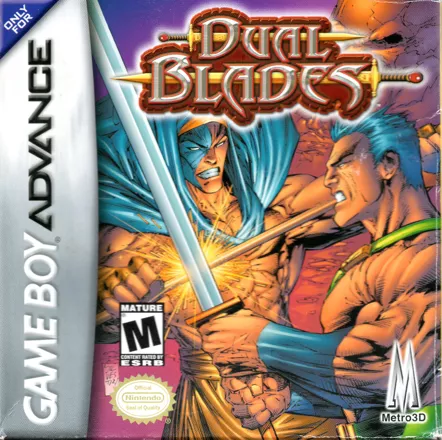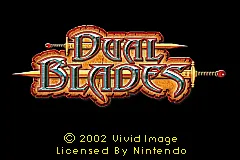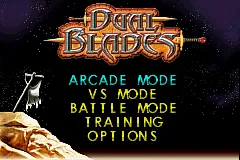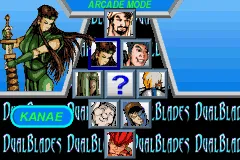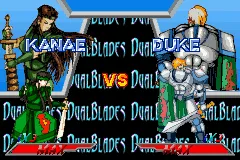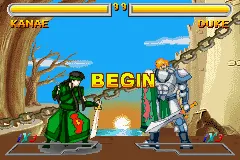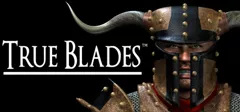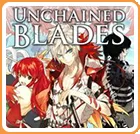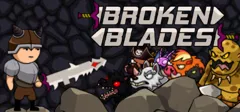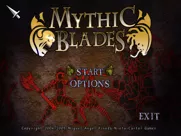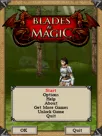Dual Blades
Description official description
Dual Blades is a side-scrolling fighting game which takes place in 150 B.C amid the Hun Empire. The worlds greatest warrior, Alperen has gained incredible energy by merging his soul with Dual Blades, a mysterious sword. The sword gives him powers beyond belief and immortality. All combatants from the past and future are summoned to fight him for its immortality or to face death.
The game features head to head fighting action with a cast of 9 unique characters. The character graphics are big and take place in colorful multi-scrolling arenas. There are unique features in the engine including combos, blood and gruesome death moves. Gameplay consists of Arcade, Versus, Battle and Training modes. Two players can go head to head via the Game Link cable.
Spellings
- デュアルブレード - Japanese spelling
Screenshots
Credits (Game Boy Advance version)
22 People
| Programming | |
| Game Design | |
| Graphics | |
| Sfx | |
| Music | |
| Music Tools | |
| Producer | |
| Producer | |
| VP, Sales and Marketing | |
| Executive Director, Marketing | |
| Director, Worldwide Creative Services | |
| Marketing Support | |
| VP, Operations | |
| Operations Support | |
| VP, Finance | |
| Business Affairs |
Reviews
Critics
Average score: 60% (based on 8 ratings)
Players
Average score: 3.0 out of 5 (based on 7 ratings with 1 reviews)
The Good
At first glance, any old-school gamer like myself will likely see this and be reminded of the mid-90’s era when the arcades were living out their last glory days. I’m speaking, of course, to the age fed by Street Fighter and Mortal Kombat. This game doesn’t look like those gems. In fact, I dare say it reminded me of one of the bottom-feeding releases of those days, namely Time Killers.
Now hold on there, I know I’m listing this in the “like” section, and bear with me on this. I love underground-style games. Those lower budget fringe titles that exist on the periphery of regular gaming. Time Killers was one such a title. It had very cartoony sprites and over-the-top gory battles that could only find a home in those dark old arcades (and later the Genesis). It was a title trying to appeal to both Street Fighter and Mortal Kombat fans with bare-minimum effort. As awful as some of those games were (there was a spiritual follow-up to Time Killers that was even more over-the-top violent), they tickled that part of me that loved low-brow horror flicks, indie fringe crap, and shamelessly violent nonsense. Games like Time Killers have always been a guilty pleasure. Giant paragraph aside, this game is that very kind of guilty pleasure. If you’re into that stuff, there’s something here for you.
Aside from that, the game is not so low-brow or “fringy” as Time Killers. It’s got a surprising level of quality buried within, which is probably the biggest surprise. Little things like a full-color manual with vast details to the game, story, and gameplay are real pluses to the aim for quality here. I have Xbox 360 games with manuals cobbled together in more half-assed manners than this. So this is pretty refreshing. That’s nothing about the game itself, of course, but it shows that for a game that will no doubt be a fringe title on the Game Boy Advance, the developers and publishers clearly put some effort into it.
There are several gameplay modes, including Arcade, VS Battle, Battle Mode, Training, and of course, a fairly extensive Options menu. Arcade is exactly what you’d think it is, so I’ll skip that. Battle Mode, however, contains a couple pretty decent modes, including Time Attack and Survival. Here, defeated opponents are replaced instantaneously without starting over with a brand new fight. So it’s quite a bit faster than a survival mode in a fighting game in a modern disc-based title, such as Tekken 6. So there’s plenty to do.
The character sprites are large and very cartoony. This is the biggest thing (besides the violence) that reminded me of Time Killers. Except that here, the characters are much, much bigger. Animation isn’t too bad, and unlike some older sprite-based fighters, like King of Fighters, the animation is fairly easy to follow and not distracting. For what it’s worth, I’ve always felt that KoF had some pretty choppy animation which often distracted me from whether or not I was accomplishing anything. It was awkward. Not so much here.
Backgrounds are generally very colorful, detailed, and generally fairly creative. Probably the coolest one is that which features a giant eyeball staring out from the background with various carved stones floating in both the back and foreground.
Music isn’t half bad, though it’s nothing super great to speak of. It’s generally a bit thicker, or more layered, than music from the arcade games of yore.
One of the cool features of this game is that every character has four “Power Moves” which can be activated once the typical “Power Bar” fills up at the bottom of the screen. As can be expected, it’s filled by attacks, special moves, and getting beaten up. Roughly halfway, the bar fills to blue and about three-quarters of the way, the bar turns red. There are two red Power Moves per character, and two blue. However, only one of each color can be used at a time, and the player selects which to use prior to each battle. This both adds a bit of strategy, and keeps things simplified by not over-complicating the gameplay. The Power Moves also occur with a cool flashy screen transition, a la the Super or Ultra combos from Street Fighter IV.
Special moves are almost all done by tapping directions on the D-Pad and pressing the A or B buttons. All characters tend to share the same basic button combinations. Control is sharp and responsive, and surprisingly good. In fact, it’s much, much better than I expected. Moves are typically easy to pull off making you feel like a pro right out of the gate. Special moves are also flashy and typically pretty cool looking. Also, taking a cue from modern fighting games, all the special moves are listed in the Pause menu.
The game also features fatalities, of a sort. Usually a pretty hard final hit can work as a fatality, labeled onscreen simply as “DEATH.” The player will generally be rewarded with a bloody fatality, should he pull off a Power Move close to the opponent’s defeat.
Some of the characters are actually pretty interesting. There are also separate endings for each character, and an auto-save feature to back up various stats and things; such as best streak in Survival mode, or which characters with which the game has been completed.
Ballsy enough to be released Mature-rated on the Game Boy Advance. Talk about rare!
Final boss is not a cheap piece of crap. Forgive me for ranting, but modern fighting games have the worst final bosses imaginable. I think Tekken’s last final-boss character that wasn’t a cheap sack of cheating crap was True Ogre—way back in part 3. Mortal Kombat set the standard for ultra-cheap final bosses with repetitive attacks, and moves that killed with two hits. Mace on the N64 featured some of the most insipidly over-powered bosses ever. Don’t even get me started on Seth, Master Hand, or that damn Samurai guy at the end of Dead or Alive. Here, thankfully, it’s a logical fight. It’s a character with some flashy-assed moves who still abides by the standard rules of the game. No single hits that decimate your life bar, no cheap shot attacks, and he isn’t two stories tall like that damned Azazel. He’s flashy and cool-looking without being asinine.
The Bad
Sound effects are nothing special. They’re all the same slashing and hitting sounds that have been in 2-D Street Fighter imitations for twenty years.
Blood and gore is pretty minimal. The game’s notoriety—what little it has—seems largely focused on the fact that it’s a violent title and one of the very few Mature-rated Game Boy Advance titles. While there is blood spray during several attacks, it’s not very pretty nor is it ever a different animation. Essentially, it all looks the same, and almost feels like it was tacked on in desperation to sell the game.
The fatalities, for that matter, are pretty laughable. There are no “actual” fatalities. No “down, down, toward, toward, low punch” to finish a guy and rip him in half (Johnny Cage, Mortal Kombat II in case you were wondering) or anything like that. Characters are usually cut in half or have the top third of their body chopped off with a savage enough final attack. Really, the sprite is just “separated” and part of it lays on the ground, with the standing half—yes, it remains standing most of the time—just showing a big red spot indicating that “this is where half a person was.” There are no bones or internal organs or anything like that. While kinda cool, it’s also really… tame. This is probably the tamest Mature-rated game I’ve ever played. That guilty-pleasure nonsense title, Time Killers, that I mentioned? That game was drenched in gore. Limbs could be chopped off during the battle. Hell, Weaponlord from the 16-bit era was a Teen-rated title that featured decapitations and eviscerations with blood flying everywhere. That game was gruesome, and much more violent than this thing.
And no, there isn’t anything like swearing, sexuality, or nudity in here. So what the hell is that M-rating for? It's just strange.
While the special moves are listed in the Pause menu, they’re also listed differently than in the manual. In the game, they’re listed as what they are. Such as “Big Slash” or “Kick,” what-have-you. The manual lists the moves with A, B, L, R. The manual is easier to go by, and this just kind of defeats the purpose of having the moves listed conveniently in the game. It creates unnecessary confusion.
In this day and age, those of us who play too many fighting games are likely used to seeing massive obscene rosters of characters. Thirty-five in Smash Bros Brawl, forty in Tekken 6, and 323,725,975 in Mortal Kombat Armageddon—you get the idea. Here we have eight characters and a final boss. So, there’s not a lot here, character-wise.
Story-wise… well, let’s face it. When was the last time we had a fighting game with a story anybody gave a crap about? I’m seriously hoping that the new revamped “back to basics” Mortal Kombat is finally interesting again. At the very least, this isn’t the dreadfully obnoxious over-blown nonsense found boring the crap out of gamers in Tekken 6. But it’s really nothing too special here, either. It’s just a backdrop for the game and a way to explain why eight very different characters are all associating in one fight. Let me simplify it for you: The story is almost the exact same thing as Soulcalibur. Several different fighters working to obtain a weapon of untold power, and the guy with said weapon trying to get rid of it.
Some of the character artwork and designs are pretty laughable. The artistry here looks like sketches from a high school student’s notebook. You only see this stuff on screens just after the fights, but damn is it unrefined. The character of Brandon has some serious muscular disorders. Somehow, this unstructured art work managed to avoid being incorporated too heavily into the on-screen fighters. For the most part, they don’t look too bad, but some look pretty amateurish.
Twice, while venturing through Arcade mode, bonus rounds appear. They are not fun. All the player does is sit there and block little monsters that leap at them from the right side of the screen. I have not figured out what the purpose of these bonus rounds is supposed to be. I block the whole time and seem to win nothing. I’ve tried blocking just before being hit, but I’m not sure it’s accomplishing anything. This isn’t fun like beating up on a car like in the Street Fighter games of the olden days. It’s just lame.
You may have noticed a lot of comparisons with other fighting games here. You may also have picked up on one of the most unfortunate drawbacks here--it almost completely lacks originality. The story, power moves, survival mode, time attack, etc. This is all pretty standard stuff in most fighting games these days.
The Bottom Line
Ahhh Dual Blades. I’m probably one of the very few people who’s even heard of this thing. And to be honest, up until about a week or so ago, I hadn’t heard of it. I came across it entirely because the nerd in me was sifting through the internet looking for lists of “the most violent video games” that I could find. This little gem appeared on a list that was something like “the Seven Most Violent Games You’ve Never Played.” Other classic titles like Loaded and Death Duel also appeared therein. Needless to say, the violence-obsessed teenage boy inside me combined with the collector geek that I am… I bought four of the games on that list, including those I mentioned.
Unlike modern console fighters, such as Street Fighter IV or Tekken 6, Easy mode here is actually easy, and not punishing as hell making the assumption that we’ve all spent the last twenty years honing our skills looking for more of a challenge. Easy should be a cakewalk. Hard mode is supposed to be hard. This game actually gets that right. I didn’t list this in “Like” or “Dislike” largely because some people may disagree. Frankly, I felt that the Easy difficulties in those games differed in no way from normal or hard modes. Here, there is a very distinct difference.
At the end of the day, the Game Boy Advance wasn’t known for fighting games, nor was it known for it’s Mature titles. This is quite the niche title. I completely expected just some one-off guilty pleasure game here—as I said—one like Time Killers, but this is surprisingly better than that. The backgrounds make use of the Game Boy Advance’s massive color palette, and characters typically animate well and look cool. The game has some flash and depth to it with its gameplay modes and the simple special moves and sharp control make this an extremely inviting title.
I honestly bought it just to have this generally rare, violent gem just for the sake of having it. Turns out, it’s not that violent, but it’s also not as lame as I once thought when I first read about it—just a short week or so ago. The blood and gore seems tacked on, and there are no “actual” fatalities, but the game is actually quite fun. Characters have lots of special moves, there are ample combos that can be done, and some strategy in the gameplay. Essentially, if you like fighting games, and enjoy the Game Boy Advance or Nintendo DS (original and Lite), you really can’t go wrong to seek this out. It can be purchased pretty cheap these days. I got mine for like ten bucks, and it was still in it’s box.
It isn't really original, but it is functional and generally polished--especially in the gameplay. Granted, it's not as insanely deep as, say, Tekken, but it has enough depth to keep the gameplay interesting, and again, it controls just beautifully. And that's extremely important.
Game Boy Advance · by ResidentHazard (3555) · 2010
Analytics
Identifiers +
Contribute
Are you familiar with this game? Help document and preserve this entry in video game history! If your contribution is approved, you will earn points and be credited as a contributor.
Contributors to this Entry
Game added by The Ring Hawk.
Additional contributors: Skippy_Chipskunk.
Game added July 14, 2004. Last modified February 22, 2023.


